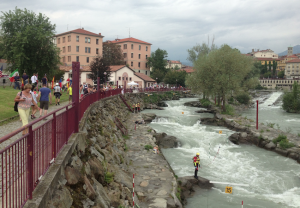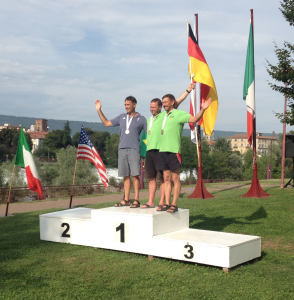I’ve written a descriptive report of the Masters Games for Sportscene (http://www.sportscene.tv/whitewater/canoe-slalom/news/canoe-slalom-at-the-torino-world-masters-games) so now I’m taking a much more personal perspective, in keeping with the ethos of Diary of a Middle Aged Kayaker.
“Have no fear of perfection – you’ll never reach it.”
― Salvador Dali
I came across this quote at a Dali art exhibition while on holiday, just before I competed in the World Masters Games. It now seems quite apt as I reflect back over the competition and my preparations.
I set myself a goal for the race that I thought was achievable; to produce two clean runs with no major time errors. I wanted to feel satisfied that I’d done my very best on the day, and my motivation was driven by a desire to make up for the times I’d raced in the 1980’s and produced disappointing performances at big races. I also dreamt about winning, but I was much less forthright about naming this explicitly. Winning was a thought that I’d draw on midway through a tough gym session rather than talk about much. I had always said to myself that if I were beaten, it would only be by someone who was very, very good. The fact is I really wanted to get on the podium. Thankfully, I did, taking the silver medal in the 50+ K1. The winner, Sven Peiler from Germany, was fastest on both runs and far enough ahead to make it convincing. I was second on both my runs, enough to prove my result wasn’t a fluke.
So what have I learned through the experience?
Lack of control creates anxiety
Some things felt out of my control in the last few weeks of my preparation for the WMG, and I wasn’t able to be as self-determined as I would have liked. For example I would have preferred to go on holiday after the race rather than before, but this was shaped by my wife’s work schedule. I was relying on friends for getting my boat to Ivrea, and for a while it looked like they would arrive the day before the race so I would only have time for one practice session. I was unsure about when and how I could collect my medical certificate and complete the registration process in Torino. The impact of this uncertainty was mild worry and anxiety, waking early with my mind racing. I took this as a sign that my attitude was too serious, and I knew this isn’t the right mindset for performing well. I reminded myself of what I could and couldn’t influence, to stay mindful and in the moment, and to try not to judge what does or doesn’t happen. Instead of worrying, I decided to trust that things would work out – which they did.
Having a race day routine works
I was pretty clear about what I needed to do, and when, on the journey up to and through race day. One of the ideas I developed through my PhD research is that there’s no single ‘ideal performance state’. Instead, it’s more useful to think about the different demands that an athlete faces before, during and after competition. Different states of mind are needed at different times of the journey. So I’ve been refining my routine over recent months, using local races to experiment with different warm-up schedules, and I made sure to apply this consistently. Interestingly, I was one of the few paddlers I noticed walking down both sides of the river to check out the gate heights and lines. The only time things went a little off-piste was the between demo runs and practice in the evening before the race. The precise timing of practice runs wasn’t clear from the published information and my warm up was a little rushed. I don’t know whether this was a factor, but I suffered a minor muscle tweak on the practice run, which although a little sore didn’t impinge on my movement the next day.
Appreciation brings me to awareness
It’s 30 years since I first raced in Europe, in the season leading up to and following the Merano World Champs. In my first slalom career the minutes before the start often used to be difficult for me, as I was nervous and worried about the outcome. But to be back in a slalom race, surrounded by competitors from around the world, feeling fit, well prepared, and ready to race now feels like a real blessing. I’ve noticed that tuning into this feeling of appreciation really helps me get into an execution mindset on the start-line. There’s a big difference between actively wanting to race, and wanting to get it over and done with.
What’s perfection? (Especially for older paddlers?)
My first run went pretty well, the only real problem being upstream gate 15. I lost my line on the approach and had to duck and dive to miss the pole, and from video I saw that I lost at least 3 seconds in the eddy. I was sitting in 2nd place after first runs with 119, which was pleasing because I knew that it left the pressure on other competitors to improve. Peiler’s running time was 10 seconds faster, and I didn’t see that I could make up that much time so any thoughts of winning were probably not realistic. So my main focus was to improve on the areas where I’d been slow and simply do the best run I could. I thought a time of 114 or so was achievable if I paddled to my potential. My second run started well, but was marred when my hand slipped off my paddle at the bottom of the main drop, and then I was clumsy again around my nemesis gate 15. I was clean, but I was pretty sure I hadn’t improved my running time, and I knew for sure it wasn’t my desired error free run. Several Germans came after me punching the air and whooping, so I didn’t think 2nd place would hold and I came off the water with a feeling of anti-climax, a sense of “so that’s it then”. Then I had to read the results three times to make sure I was seeing them accurately – I was still in second place; I’d made the podium and won a medal. I felt an intense mix of emotions; satisfaction, relief, surprise, happiness….and disappointment that my run wasn’t as good as I wanted it to be.
Where to now?
The WMG has been my main kayaking focus for the last year and a half. Winning a medal was great, and it’s a good way to answer the question “how did you get on?” It’s been fantastic to have a big goal to chase, and I’ve really enjoyed the training. So I want to continue training for the remaining domestic events, and I’d love to finish high enough in Div 1 to race in the British Open at Lee Valley in November. The next Masters Games is in New Zealand, and it would be a lot of fun to take a trip there in 2017 to paddle some rivers and catch up with old friends.
Which brings us back to Dali’s words on perfection. Was I unrealistic in seeking a ‘perfect’ run, free of major errors? Do I really know what that means for me, and how do I benchmark performance as a 50+ paddler? Does this goal become another source of distraction from a pure focus on being ‘in the moment’ when I race?
Sven Peiler’s running times in the 50+ were pretty inspiring, and have really made me think about what I need to do in order to get down a course that fast (another blog post to come on this). Reflecting on it now, I think Dali might be right that perfection can’t be reached, but I still feel driven to explore how close I can get to my definition of it. It goes back to Bill Endicott’s description of slalom, as the search for the ultimate run – this seems as good a goal as any for me. My ultimate run is still on a river out there waiting for me, and I’m looking forward to continuing the search.
P.S Well done to the fastest British K1 competitor at the WMG, Scotland’s George Spittal, who finished 5th in the 45 + category with 116.18.
Comments here please or on the Facebook page




